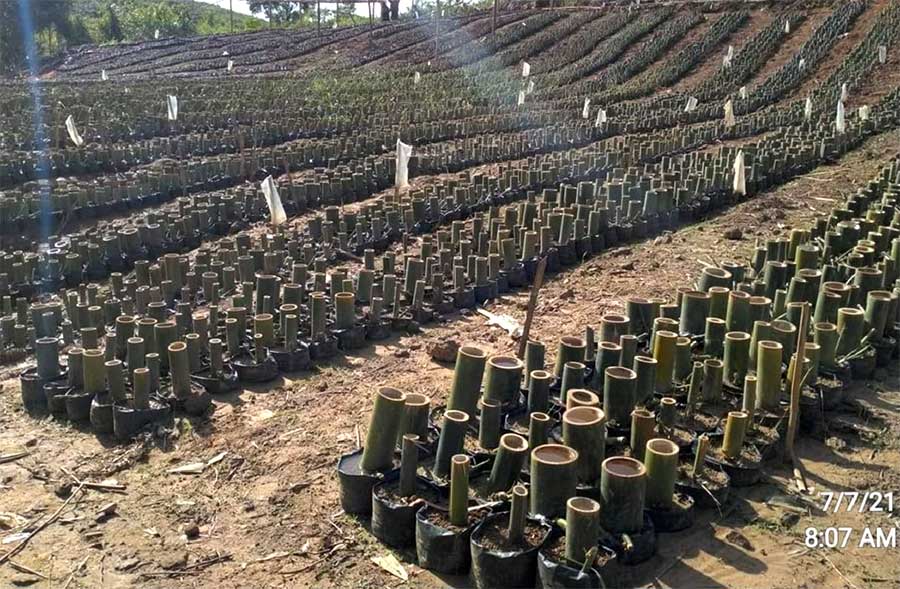
By Esther Abegale Cinco
To forward reforestation in the country, the Department of Environment and Natural Resources (DENR) upgraded a program it initiated in 2018.
The Enhanced National Greening Program (NGP) is the latest version of the National Greening Program by the late President Benigno S. Aquino III.
Under the leadership of current DENR Sec. Roy Cimatu, the department’s top priority is to improve the quality of environment, particularly air and water; and to address solid waste problems by implementing environmental protection programs and projects.
BAMBOO DEVELOPMENT PROGRAM
The NGP covers several programs, one of those is the Bamboo Development Program which focuses on rehabilitation and protection of our forests.
Forester Arman Moncatar of the Department of Environment and Natural Resources (DENR) in Kabankalan City, Negros Occidental explained that the Bamboo Development Program, which is anchored to the NGP will last until 2028.
According to Moncatar, Sec. Cimatu has plans of turning Western Visayas into the bamboo capital of the country.
The Bamboo Development Program is a three-year contract of the department and the partner organization.
The nursery and plantation will start during the first year and maintenance and protection will follow in the remaining two years.
“Under sa maintenance and protection, may mga activities. First is yung food patrol, iikutin nila yung buong plantation for the whole year. Meron din na replanting, yung mga patay na itinanim, tataniman ulit. Lastly, ang paglalagay ng mga fertilizer para maganda ang tubo ng tanim,” Moncatar said.
When the contract ends, the financial aid from the department will also be concluded.
But Moncatar clarified that the project will not end, only the financial support from the government.
“After ng three years, ibabalik na yung nursery sa people’s organization na partner namin. Sila na yung mag-mamanage ng plantation which is very sustainable,” he further stated.
HOW TO PARTNER WITH THE DENR
DENR does not accept any individual or private contract for the project as they are to partner with people’s organization within the communities.
“Yung mga partners natin ay mostly farmer’s association, cooperatives, fishermen’s association, or women’s association. If meron silang registration sa Department of Labor and Employment (DOLE), we partner with them,” Moncatar explained.
The people’s organization would have to send a letter of intent to the department for their assistance in the nursery. Then, the DENR will directly visit the community, coordinate with the barangay, the PNP, and the military before they proceed to the area.
“After that, magkakaroon na tayo ng SMP. Survey, mapping, and planning. Pagpaplanuhan kung saan itatanim, anong itatanim, at kung paano itatanim,” stated Moncatar.
Aside from surveying, mapping, and planning, the DENR also conducts soil sampling.
They will collect soil in the intended area of plantation which will be sent to the laboratory for checking if what specie of plant is suited for the soil.
This will help the department and the organization identify what specie of plant would be best for the area.
“Pag natapos na ‘yan lahat, doon na magsisimula yung training with the partners, contracting, and signing of MOA between the department and the community. After the signing, meron ng mobilization,” he said.
BENEFITS OF THE NGP
Moncatar explained that bamboo plantation is one way to prevent climate change as its root system are wide.
“Yung kawayan ay very sustainable kasi after six or seven years, meron na siyang tubo. Hindi katulad ng mga puno na itinatanim, hindi talaga mapuputol kasi ang native trees natin ay for protection and conservation, so wala talagang cutting,” Moncatar added.
He further stated that wild animals and plants are now slowly returning because of the flourished nurseries within the various areas in Negros.
Not only would it be good for the environment, but bamboo is one of the commonly used construction materials as well.
Aside from the environmental gain, the project also generated employment in Negros.
“Kung gusto nilang magtrabaho, babayaran sila galing po sa department at diretso na po ito sa bank accounts ng partners. Nagbabayad po tayong ng pagtatanim, pagpuputol at pag-aalaga ng mga bamboo natin,” said Moncatar.
These people are trained for two to three days with the right technique and maintenance for the plantation.
Moncatar explained that their partners are capacitated enough to avoid any failures.
As this project is situated in urban areas, forest lands, and secluded places owned by the government, what the department needs is the cooperation and the commitment of the community as they are the most vital in the project.


















